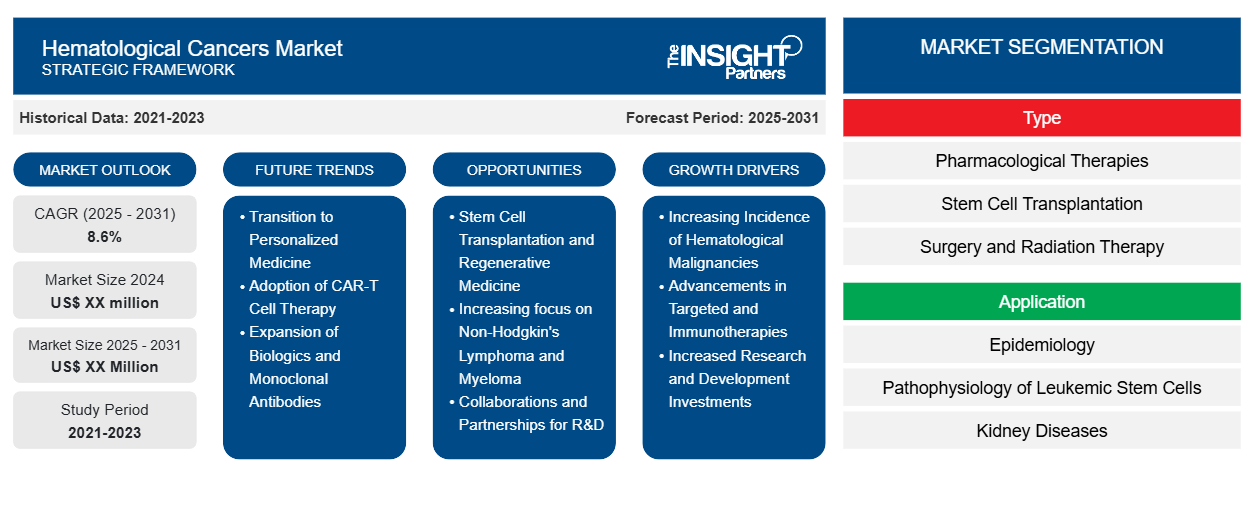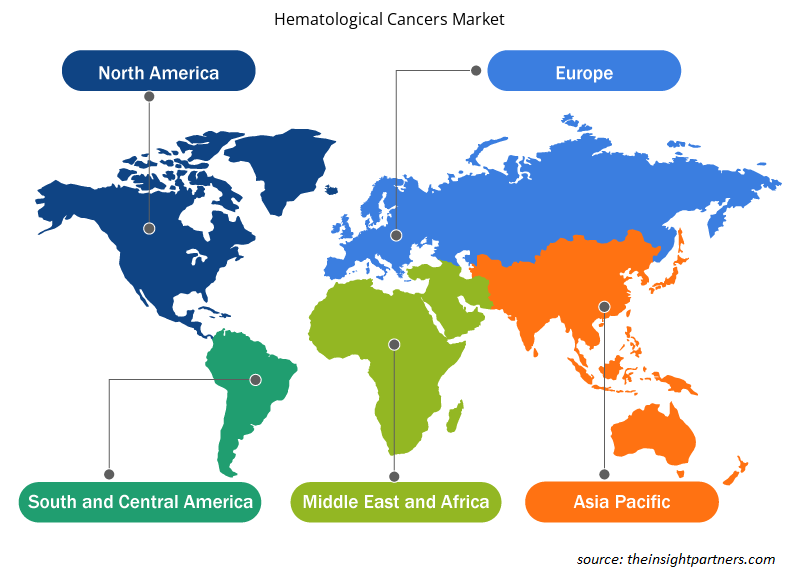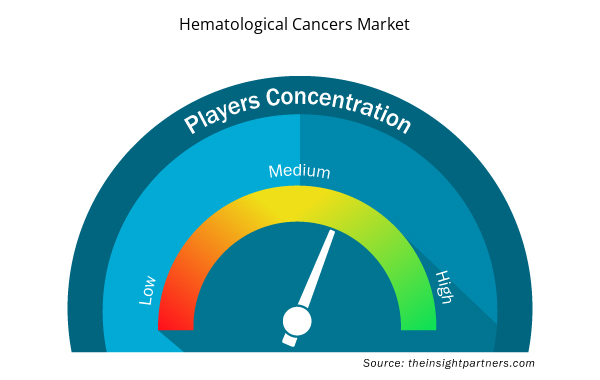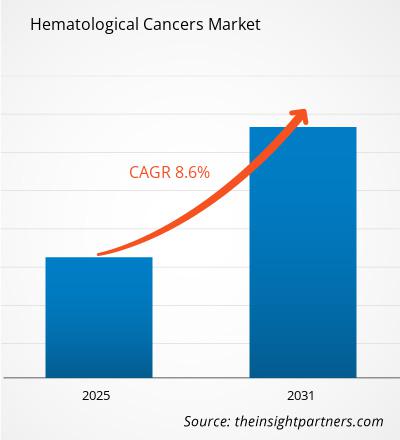The Hematological Cancers Market is expected to register a CAGR of 8.6% from 2025 to 2031, with a market size expanding from US$ XX million in 2024 to US$ XX Million by 2031.
The Hematological Cancers Market report covers analysis by Type (Pharmacological Therapies, Stem Cell Transplantation, Surgery and Radiation Therapy, Anemia Treatment, Thrombosis Treatment, Neutopenia Treatment, Symptomatic treatment); Application (Epidemiology, Pathophysiology of Leukemic Stem Cells, Kidney Diseases, Genetic Diseases, Other Diseases), and Geography (North America, Europe, Asia Pacific, and South and Central America). The global analysis is further broken-down at regional level and major countries. The report Offers the Value in US$ for the above analysis and segments.
Purpose of the Report
The report Hematological Cancers Market by The Insight Partners aims to describe the present landscape and future growth, top driving factors, challenges, and opportunities. This will provide insights to various business stakeholders, such as:
- Technology Providers/Manufacturers: To understand the evolving market dynamics and know the potential growth opportunities, enabling them to make informed strategic decisions.
- Investors: To conduct a comprehensive trend analysis regarding the market growth rate, market financial projections, and opportunities that exist across the value chain.
- Regulatory bodies: To regulate policies and police activities in the market with the aim of minimizing abuse, preserving investor trust and confidence, and upholding the integrity and stability of the market.
Hematological Cancers Market Segmentation
Type
- Pharmacological Therapies
- Stem Cell Transplantation
- Surgery and Radiation Therapy
- Anemia Treatment
- Thrombosis Treatment
- Neutopenia Treatment
- Symptomatic treatment
Application
- Epidemiology
- Pathophysiology of Leukemic Stem Cells
- Kidney Diseases
- Genetic Diseases
- Other Diseases
Customize This Report To Suit Your Requirement
You will get customization on any report - free of charge - including parts of this report, or country-level analysis, Excel Data pack, as well as avail great offers and discounts for start-ups & universities
Hematological Cancers Market: Strategic Insights

- Get Top Key Market Trends of this report.This FREE sample will include data analysis, ranging from market trends to estimates and forecasts.
Hematological Cancers Market Growth Drivers
- Increasing Incidence of Hematological Malignancies: The global incidence of hematological cancers has been steadily increasing, thereby fueling the growth of the market. The aging population, changes in lifestyle, and environmental influences are related factors that present an upward trajectory. Leukemia, lymphoma, and myeloma are some of the most common hematological cancers diagnosed, and their increase in prevalence leads to an increase in demand for advanced therapies, diagnostics, and treatment options.
- Advancements in Targeted and Immunotherapies: The development of targeted therapies and immunotherapies has significantly altered the treatment paradigm for hematological cancers. Targeted therapies focus on specific molecular targets associated with cancer cells, while immunotherapies such as CAR-T (Chimeric Antigen Receptor T-cell) therapy have been highly effective in treating some blood cancers. These innovative treatments are driving the growth of the hematological cancer market by offering more effective and less toxic treatment options compared to traditional chemotherapy.
- Increased Research and Development Investments: The hematological cancers market is experiencing a critical and ongoing investment from pharmaceutical and biotechnology companies regarding research and development. In February 2024, AbbVie Inc. bought ImmunoGen Inc., including its flagship cancer therapy, ELAHERE. The acquisition will likely speed up AbbVie's commercial and clinical presence in the space of solid tumors. Companies focus on developing drugs, therapies, and treatments against hematological cancer. This has led to further R&D efforts in discovering molecular targets, effective therapeutic approaches, and advancements towards personalized medicine to boost the growth of the market.
Hematological Cancers Market Future Trends
- Transition to Personalized Medicine: One of the more prominent trends in the hematological cancers market is an increased focus on personalized or precision medicine. Treatments tailored to the genetic makeup of an individual as well as specific characteristics of his or her cancer cells have grown in popularity. Personalized therapies, including targeted treatments and immunotherapies, are making better patient outcomes and fewer adverse effects possible; this is offering a more efficient way of handling hematological cancers.
- Adoption of CAR-T Cell Therapy: CAR-T cell therapy is revolutionizing the treatment for some hematologic cancers, like relapsed or refractory B-cell lymphomas and leukemia. This immunotherapy aims to modify the patient's T-cells to target and kill the cancer cells. The success of CAR-T therapies, such as Kymriah and Yescarta, is driving the expansion of the market for hematologic cancers, particularly with expanding indications for additional blood cancers and constant improvements in technology.
- Expansion of Biologics and Monoclonal Antibodies: The use of biologics and monoclonal antibodies is increasing in the treatment of hematological cancers. Monoclonal antibodies, including Rituximab for lymphoma and Daratumumab for myeloma, have become an integral part of the treatment regimens. These biologics can target specific proteins in cancer cells, which can lead to better outcomes and fewer side effects. Roche launched a new highly sensitive SITU hybridization test in June 2024. The newly clinically approved test is to help pathologists differentiate a B-cell malignancy from a normal. The launch helps to test more diagnosed patients who may have B-cell lymphoma. The future of the hematological cancers market is being shaped by the continued development of novel biologics and monoclonal antibodies.
Hematological Cancers Market Opportunities
- Stem Cell Transplantation and Regenerative Medicine: Hematopoietic stem cell transplantation, popularly known as bone marrow transplant, is considered a cornerstone in the treatment of many hematologic cancers, which include leukemia and lymphoma. New opportunities open up in terms of innovation given the advancements in stem cell technology, including graft-versus-host disease management improvements and better transplants. Expectations are great for new stem cell therapy allied with regenerative medicine to produce new, very effective options that would be of benefit to patients who have been excluded by other forms of treatment.
- Increasing focus on Non-Hodgkin's Lymphoma and Myeloma: Leukemia treatments have advanced, while other hematologic cancers, like non-Hodgkin's lymphoma and myeloma, are drawing increasing attention. Non-Hodgkin's lymphoma is on the increase in incidence all over the world, and myeloma still does not have very effective treatment available for late stages. New drugs, personalized medicines, and biological drugs are all targeted toward these cancers and hold enormous market growth potential.
- Collaborations and Partnerships for R&D: Strategic pharmaceutical companies, partnerships, and research organizations in combination with academic institutes open significant areas of opportunities for developing new treatments against hematological malignancies. Shared research leads to new therapeutic products, especially in emerging areas like gene editing, immunotherapy, or targeted therapy. By this partnership, the process would accelerate the whole process of creating a new medical product.
Hematological Cancers Market Regional Insights
The regional trends and factors influencing the Hematological Cancers Market throughout the forecast period have been thoroughly explained by the analysts at Insight Partners. This section also discusses Hematological Cancers Market segments and geography across North America, Europe, Asia Pacific, Middle East and Africa, and South and Central America.

- Get the Regional Specific Data for Hematological Cancers Market
Hematological Cancers Market Report Scope
| Report Attribute | Details |
|---|---|
| Market size in 2024 | US$ XX million |
| Market Size by 2031 | US$ XX Million |
| Global CAGR (2025 - 2031) | 8.6% |
| Historical Data | 2021-2023 |
| Forecast period | 2025-2031 |
| Segments Covered |
By Type
|
| Regions and Countries Covered | North America
|
| Market leaders and key company profiles |
Hematological Cancers Market Players Density: Understanding Its Impact on Business Dynamics
The Hematological Cancers Market market is growing rapidly, driven by increasing end-user demand due to factors such as evolving consumer preferences, technological advancements, and greater awareness of the product's benefits. As demand rises, businesses are expanding their offerings, innovating to meet consumer needs, and capitalizing on emerging trends, which further fuels market growth.
Market players density refers to the distribution of firms or companies operating within a particular market or industry. It indicates how many competitors (market players) are present in a given market space relative to its size or total market value.
Major Companies operating in the Hematological Cancers Market are:
- AbbVie, Inc.
- Astellas Pharma US
- Bio-Rad Laboratories
- Bristol-Myers Squibb Company
- C. R. Bard
- Celgene Corporation
Disclaimer: The companies listed above are not ranked in any particular order.

- Get the Hematological Cancers Market top key players overview
Key Selling Points
- Comprehensive Coverage: The report comprehensively covers the analysis of products, services, types, and end users of the Hematological Cancers Market, providing a holistic landscape.
- Expert Analysis: The report is compiled based on the in-depth understanding of industry experts and analysts.
- Up-to-date Information: The report assures business relevance due to its coverage of recent information and data trends.
- Customization Options: This report can be customized to cater to specific client requirements and suit the business strategies aptly.
The research report on the Hematological Cancers Market can, therefore, help spearhead the trail of decoding and understanding the industry scenario and growth prospects. Although there can be a few valid concerns, the overall benefits of this report tend to outweigh the disadvantages.
- Historical Analysis (2 Years), Base Year, Forecast (7 Years) with CAGR
- PEST and SWOT Analysis
- Market Size Value / Volume - Global, Regional, Country
- Industry and Competitive Landscape
- Excel Dataset



Report Coverage
Revenue forecast, Company Analysis, Industry landscape, Growth factors, and Trends

Segment Covered
This text is related
to segments covered.

Regional Scope
North America, Europe, Asia Pacific, Middle East & Africa, South & Central America

Country Scope
This text is related
to country scope.
Frequently Asked Questions
The major factors driving the Hematological Cancers Market are Increasing Incidence of Hematological Malignancies, Advancements in Targeted and Immunotherapies, and Increased Research and Development Investments
The key future trends of the market are Transition to Personalized Medicine, Adoption of CAR-T Cell Therapy, and Expansion of Biologics and Monoclonal Antibodies
The leading players operating in the Hematological Cancers Market include AbbVie, Inc., Astellas Pharma US, Bio-Rad Laboratories, Bristol-Myers Squibb Company, C. R. Bard, Celgene Corporation, GlaxoSmithKline plc, Novartis International AG, and Otsuka Pharmaceutical Co., Ltd.
The report can be delivered in PDF/PPT format; we can also share excel dataset based on the request.
Some of the customization options available based on the request are an additional 3–5 company profiles and country-specific analysis of 3–5 countries of your choice. Customizations are to be requested/discussed before making final order confirmation, as our team would review the same and check the feasibility.
Trends and growth analysis reports related to Life Sciences : READ MORE..
1. AbbVie, Inc.
2. Astellas Pharma US
3. Bio-Rad Laboratories
4. Bristol-Myers Squibb Company
5. C. R. Bard
6. Celgene Corporation
7. GlaxoSmithKline plc
8. Novartis International AG
9. Otsuka Pharmaceutical Co., Ltd.
10. Teva Pharmaceutical Industries Ltd.

 Get Free Sample For
Get Free Sample For